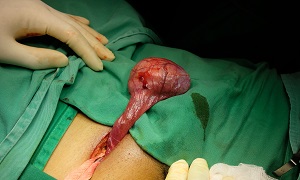Testicular Cancer
Cancer occurs when the cells grow abnormally and also invade nearby tissues and eventually spreading to other organs in the body through the bloodstream or the lymph nodes.
Testicular Cancer is the cancer of the testicles (testes) that are located inside the scrotum. The main function of the testicles is the production of male sex hormone (testosterone) & sperm production. Testicular cancer may attack one or both testicles and if untreated, may also spread to other parts of the body.
Testicular Cancer causes
- Family history of testicular cancer.
- An undescended testicle (testicle has not moved into the scrotum).
- Age 20-34 years, however it can occur at any age.
- HIV/AIDS
- Men with fertility problems have an increased risk of testicular cancer.
- Men with inguinal hernia are at greater risk of developing testicular cancer.
- Taller men have an increased risk of testicular cancer.
Signs & symptoms of Testicular Cancer
- A lump which is painless can be felt in the testicle.
- Swelling of the testicle.
- Swollen lymph nodes.
- Fatigue
- Weight loss
- A dull pain in the testicle, scrotum or groin.
- Heavy or feeling as there is something in the scrotum.
Types of Testicular Cancer
The testicles are made up of many types of cells and each of these cells can give origin to a variety of cancer in the testicles. It is important to understand the type of cancer for an effective treatment strategy, because the treatment can vary by the type of cancer in the testicles.
- Germ Cell Tumors (GCTs)- Germ Cells are the cells that produce the sperm. More than 90% of testicular cancers originate in the germ cells. There are two main types of GCTs, viz. Seminomas and Non-seminomas Germ Cell Tumor (NSGCT). Both of them can occur at the same rate and men can have either one or both.
- Seminoma Tumors- Seminoma Tumors are generally less aggressive than non seminomas. Although they can happen at all age groups, but elderly men are more likely to have seminoma.
- Non-seminoma- Non-seminoma Germ Cell Tumors are the more aggressive types. They generally happen occur in younger men. They grow and spread rapidly and hence, need immediate intervention. NSGCTs have variety of sub-types such as; Choriocarcinoma, Embryonal carcinoma, Teratoma & Yolk Sac tumor
Stages of Testicular Cancer
- Stage 1: Cancer is confined to the testicles.
- Stage 2: Cancer has spread to the lymph nodes in the testicle
- Stage 3: Cancer has spread beyond the lymph nodes in the testicle & it may be present in parts of the body that are far away from the testicles like the lungs, liver, kidney and brain.
Diagnosis of Testicular Cancer
Physical examination
Medical History of the patient
Blood test
CT scan
CT Scan takes a series of X-ray images of the abdomen, chest and pelvis to look for signs that cancer has spread.
Treatment options for Testicular Cancer
The treatment of Testicular Cancer depends on the stage and grade of cancer. For all stages and types of cancers, surgery is commonly needed. However, other interventions such as Chemo and Radiation treatments are generally needed for more advanced stage and more aggressive testicular cancers, typically, Non-Germ Cell Testicular Cancers. Following are the treatment options for Testicular Cancer-
Surgery
The Surgical Options for the treatment of testicular cancer includes:
Radical inguinal orchiectomy
Radical inguinal orchiectomy is is the primary intervention for all types and grades of testicular cancer. In this surgery, the surgeon makes an incision in the groin & extracts the entire testicle through the opening. The patient can have the option of inserting a prosthetic saline-filled testicle.
Retroperitoneal lymph node dissection
For some patients, surgery may be the only intervention needed. After surgery, oncologist will recommend periodic follow-ups and repeat of blood tests and CT scans to check for any new development.
Other Interventions:
However, patients with high grade testicular cancers and advanced stage cancers will need to undergo the following interventions to kill cancer cells and prevent further metastasis.
Radiation Treatment

Radiation treatment is a kind of cancer treatment that uses high doses of radiation beams to kill cancer cells to shrink the tumors. Radiation kills the cancer cells by destroying the DNA. Cancer cells with damaged DNA fail to multiply and die. They are then removed by the body’s mechanism.
Chemo
Chemo is the use of anti-cancer drug that helps to slow or stop the growth of rapidly dividing cells that cause cancer. It prevents the growth of rapidly dividing cells by killing the dividing cells.
Despite its side effects, chemo is still the most widely used cancer treatment option. Unlike radiation and surgery which treats cancer cells at particular locations, chemo drugs can kill cancer cells that have metastated (spread) to different organs in the body.






